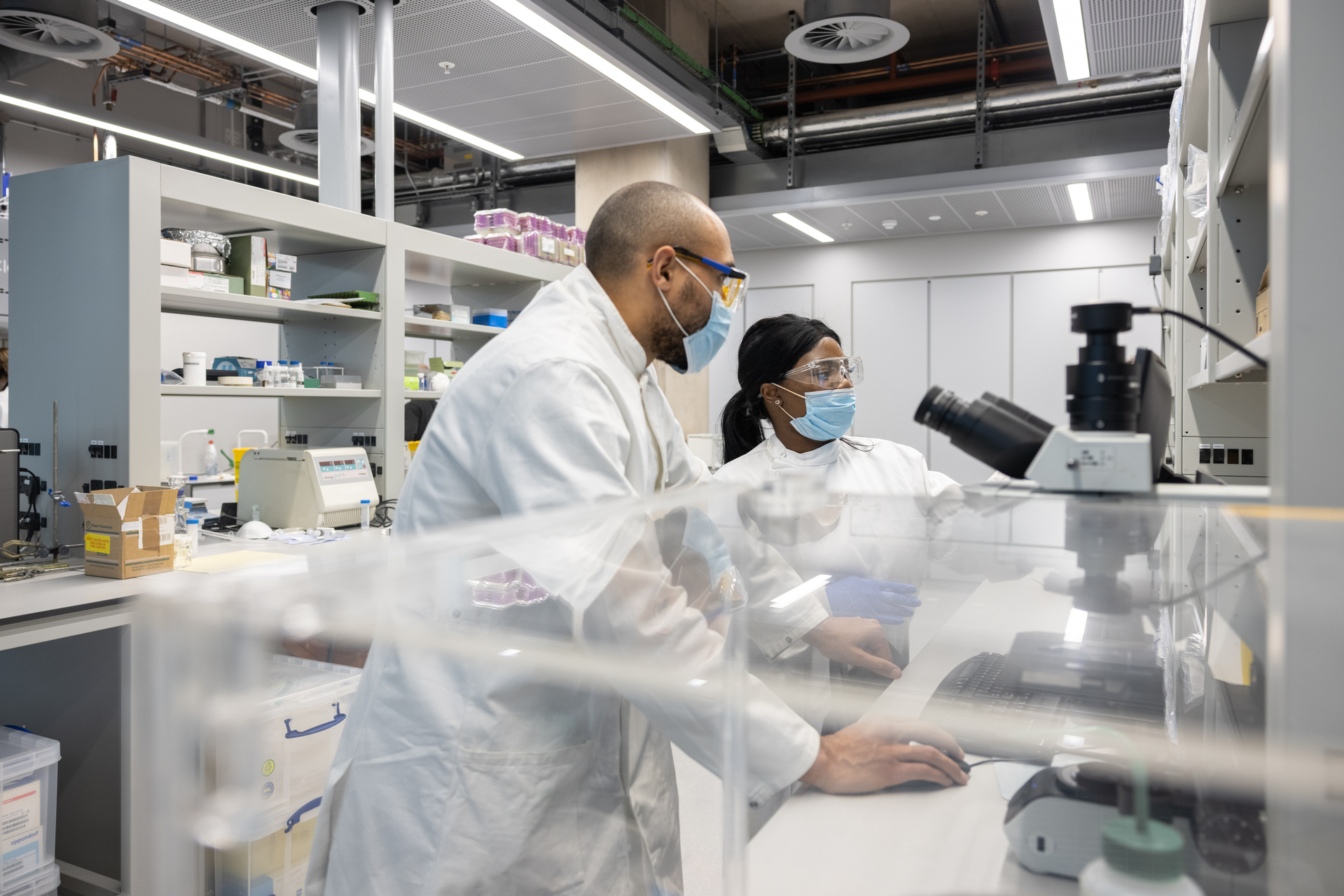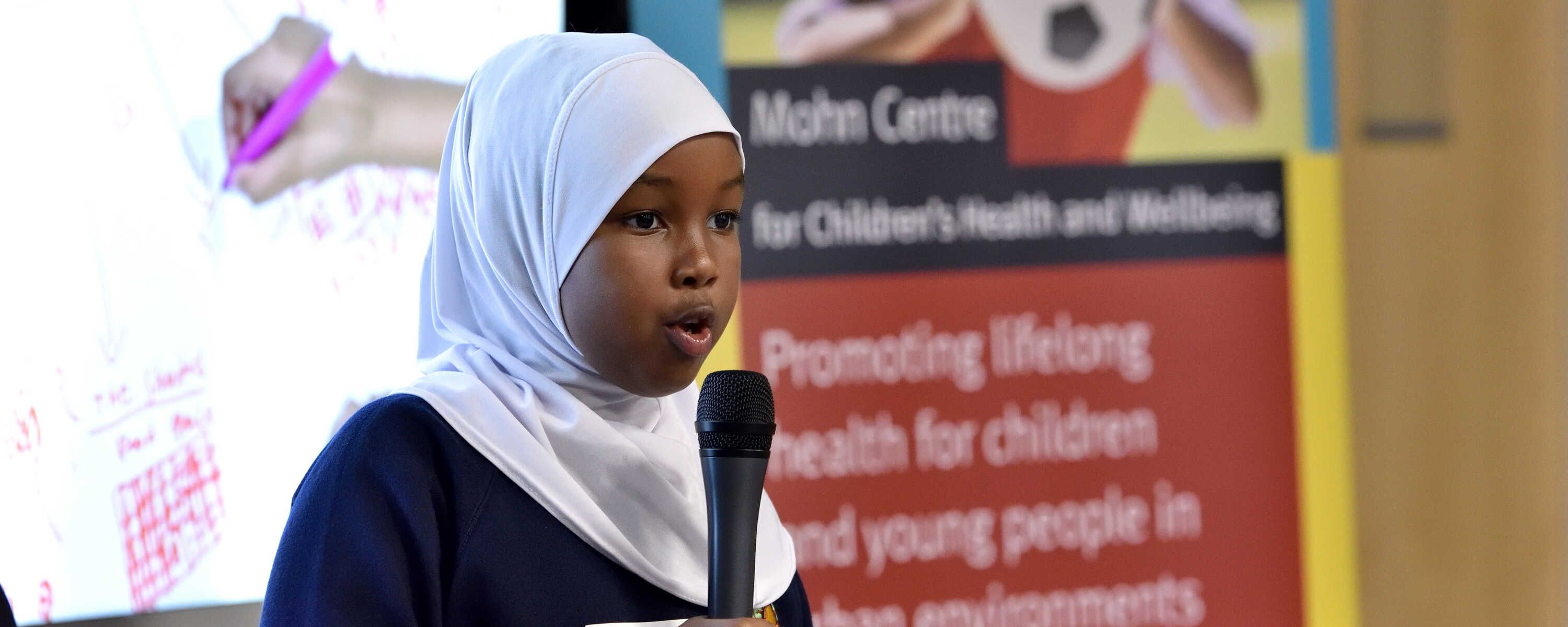From the discovery of penicillin to leading the global response to the Covid-19 pandemic, Imperial has always been at the forefront of the fight for global health. Today, philanthropic support for the School of Public Health is helping to protect health and improve healthcare systems worldwide. From control and treatment of infectious diseases to improving health in infancy and throughout the life course into old age, our research touches the lives of millions.
The last 50 years have seen remarkable progress on global health, with significantly increased life expectancy, reduced infant mortality, and the near eradication of diseases like polio through vaccination. Yet despite these major public health successes, serious health challenges persist. Infectious diseases continue to pose a major threat, from new pathogens with pandemic potential to enduring challenges like malaria, tuberculosis, and HIV. An ageing population with poor later-life health, combined with rising levels of obesity, diabetes, and cardiovascular disease, are increasing the demand on healthcare systems worldwide. A changing climate, rising social inequality and global instability further threaten the gains of the past decades.
In a rapidly changing and increasingly unstable world, how do we continue to safeguard health, to increase healthy life expectancy, to reduce levels of disease and make healthcare systems more effective, efficient and resilient?
 Above: Researchers from the Environmental Research Group within the School of Public Health are investigating the effects of pollution on health.
Above: Researchers from the Environmental Research Group within the School of Public Health are investigating the effects of pollution on health.
To find solutions to these challenges, a fresh approach is urgently needed. Researchers at the School of Public Health are developing mathematical models of disease and healthcare systems that give an unprecedented level of insight into the causes of disease and allow the effectiveness of different strategies for disease control and treatment to be tested digitally, before being implemented in the real world. This technology and the insights it generates lay the groundwork for a new era of evidence-based public health policy that can deliver improved care and health for millions. The School of Public Health is at the forefront of this movement, using advances in artificial intelligence and computational modelling to generate insights and policy recommendations from the vast amounts of health data now available, from digitalised medical records to new forms of genomic information.
Our discoveries have already been translated into effective, evidence-backed interventions that protect the health of millions worldwide, guiding the response to epidemic disease outbreaks, informing global health policy, and improving health system. With philanthropic support, we can go further, expanding research and educational programmes, extending our reach internationally and protecting the health of communities locally and nationally.
Transforming health: supporting the School of Public Health
In 2024 we celebrated the opening of a new home for the School of Public Health at the White City Campus. This new research facility brings together public health research in a single location, enabling growth in research and education programmes, new interdisciplinary collaborations with partners from across Imperial and closer links with local healthcare providers and the community. Philanthropy has played a critical role in this, enabling the construction of the building and supporting major new research hubs to improve children’s health and wellbeing, to combat health threats worldwide, to analyse the impacts of the environment on health and to increase global pandemic preparedness.
The £75 million that has already been donated has revolutionised our work. But there is more that we want to achieve. Philanthropy will enable a new research centre in health analytics and healthcare resilience, will support the fit-out of research labs for emerging infections, and will galvanise research across priority themes in child health, women’s health and healthy ageing. Join us in the final phase of our journey to transform health and together we can pioneer solutions to the most pressing health challenges and secure better health for millions worldwide.
Philanthropic support drives advances across four themes
-
Over 30 pathogens with pandemic potential now identified by the WHO.
-
249 million cases of malaria worldwide in 2022.
-
41 million lives lost to cancer, heart and lung disease each year.
The School of Public Health is addressing global health challenges that affect communities around the world. From tackling infectious disease outbreaks like Covid-19, Ebola and Mpox to countering the rise of lifestyle-related conditions like cancer, heart disease and dementia, our work combines cutting-edge data analytics with global networks of influence to improve health outcomes worldwide.
Philanthropic support will help us push this work further by expanding research on emerging pathogens with pandemic potential and advancing research on how diet influences health. With philanthropic investment, we can help to protect the health of communities worldwide.
With your support, we will:
- Create academic posts in data analytics and infectious disease outbreak modelling
- Establish a Centre for Food and Nutrition to understand the relationship between diet and health
- Expand research into antimicrobial resistance and emerging pathogens
-
Worldwide, 160 million children with obesity.
-
More than 110,000 children aged 5-16 in London have a mental health disorder.
-
700,000 of London’s children live in poverty.
Every child deserves the best start in life. By focusing on children’s health from the earliest stages, we’re helping to ensure that more young people are happier and healthier. Our researchers are uncovering how genetic, lifestyle and environmental factors interact in early life to impact lifelong health. We are exploring imaginative new ways to address childhood obesity, identifying risk factors for childhood asthma and improving care for premature babies to support their health into adulthood. We are also world-leading on research around children’s mental health, including the effects of mobile technology on cognitive development and the impact of the COVID-19 pandemic on teenagers’ wellbeing. With philanthropic support, we can expand this work, launching new research on mental health, obesity and the effects of pollution on child development, and improving long-term health outcomes for pre-term babies.
With your support, we will:
- Expand neonatal research to improve care and outcomes for babies
- Grow research on the effects of pollution on child development
- Counter the crisis in teenage mental health
Better community health relies on effective, high-quality healthcare. Yet today’s health systems face immense challenges, from rising demand to staff shortages and chronic underinvestment. How can we deliver the transformational change needed to build healthcare systems that can adapt to growing demand, ensure equitable access and build resilience against future crises?
Rising demand, underinvestment and staff shortages are stressing healthcare systems. In the UK, one in ten people now wait more than 12 hours to be seen in A&E and public satisfaction in the NHS reached its lowest level ever in 2024. Globally, by 2030 there will be a global shortfall of 18 million healthcare workers.
At the School of Public Health, we are driving change by taking a ‘whole system, whole population’ approach. Our research brings together health economics, health policy and systems science, and data science and healthanalytics to create advanced computational models that provide a detailed picture of how healthcare systems function as a whole. These models allow health leaders to simulate the effects of major interventions, enabling evidence-based decision-making before changes are implemented. This approach is already making a difference – groundbreaking work in Malawi has shown how a whole-system model can deliver better, more efficient care.
Building on this success, we are developing a similar ‘digital twin’ for healthcare across Northwest London. This ambitious project will improve care by equipping decision-makers with the insights needed to guide investments in healthcare infrastructure, workforce planning and service delivery. With philanthropic support, we can expand this work to benefit communities globally, helping to build healthcare systems that meet today’s needs while being prepared for the challenges of tomorrow. Philanthropic support will be crucial in realising this ambition, enabling the creation of a Centre for Healthcare Analytics, Simulation and Evaluation under the direction of a new Chair in Healthcare Analytics.
-
2 billion worldwide aged 60+ by 2050.
-
24% of people in the UK will be aged 65+ by 2041.
-
982,000 people in the UK are estimated to have dementia.
It’s not just about adding years to life, but also life to years. While people are living longer, these extra years don’t always mean extra years of good health. Hundreds of millions worldwide face age-related illnesses like arthritis, diabetes, heart disease and dementia, which limit independence and enjoyment of life, and put pressure on health systems. Our research explores how genetics, lifestyle and diet interact over a lifetime to protect against, or increase the risk of, poor health in later life. We use large-scale, long-term studies on heart disease, stroke, diabetes, and dementia to track the health of thousands of people over many years, to uncover factors that promote healthy ageing. With philanthropic support, we can expand our focus on women’s health across the life course – a historically neglected field – and establish a Centre for Healthy Ageing to level up work aimed at preventing physical and cognitive decline in later life.
With your support, we will:
- Expand our focus on women’s health across the life course
- Establish a Centre for Healthy Ageing
Join us in transforming health
We have brought together an inspiring community of donors and advocates who share our commitment to improving global health outcomes. We are deeply grateful to those who have given so generously, helping us to harness the power of science to shape humanity’s response to the greatest global health threats. Yet here is much more that we can achieve: new research to support healthy ageing, to protect the health and wellbeing of children and infants, and pioneering work on using computational modelling to create resilient, effective healthcare systems in the UK and beyond.
To discuss how your philanthropy can drive discovery and impact in health, please contact:
Contact us
-
Rowena Morgan
/prod01/channel_3/media/images/people-list/Rowena-Morgan--tojpeg_1563528148184_x4.png)
Personal details
Rowena Morgan Deputy Director of Development, Faculty of MedicineSend email+44 (0)20 7594 6743
Location
Level 1, Faculty Building
South Kensington Campus
London SW7 2AZ -
Pramod Puthumanapully
/prod01/channel_3/media/images/people-list/Pramod.jpg)
Personal details
Pramod Puthumanapully Head of Development, Faculty of MedicineSend email+44 (0)207 594 3299
Location
Level 1, Faculty Building
South Kensington Campus
London SW7 2AZ
We are incredibly grateful to all those who have donated so generously to advance research and education in the School of Public Health. Together, we are responding to the most pressing health threats in the UK and worldwide.






